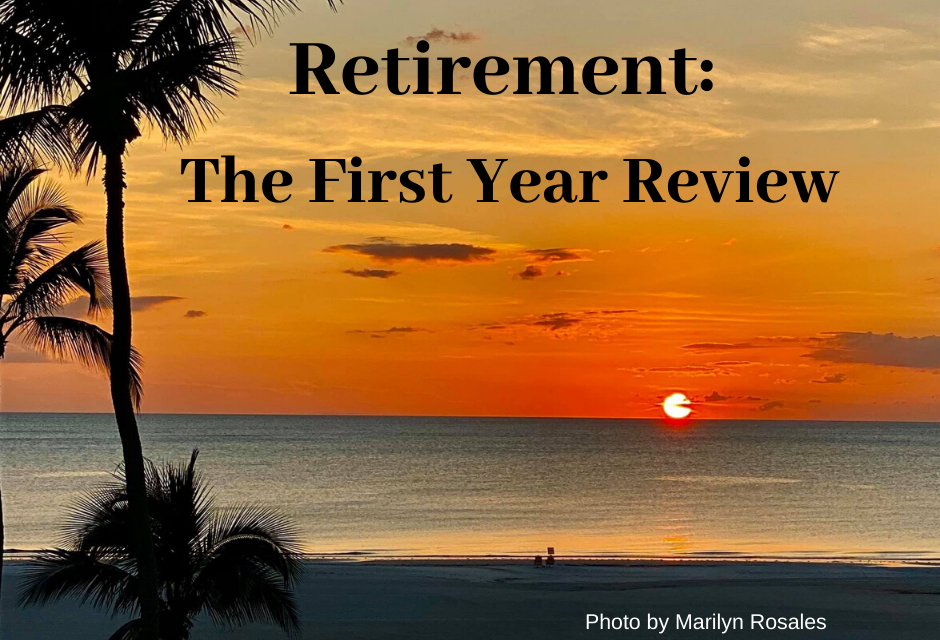The first year of retirement rarely goes as planned. Here are some observations from my experience.
This month marks the end of my first full year of retirement. Like many retirees, my first year didn’t go exactly according to script. It was a good year, but not without some challenges and new realizations. Hopefully these reflections from my first full year of retirement can help some of you have a smooth transition.
By the way, this month is also the first anniversary of my blog, This Retirement Life. I will share my thoughts about that adventure too.
First year of retirement
Friends joke with me about writing a retirement blog because in reality, I have not yet fully retired. I am still working part-time, in addition to blogging. My last day of full-time work, however, was nearly a year and a half ago, so to me, that counts as retirement.
Retiring from a full-time work schedule was a monumental life change for me. I wouldn’t call myself a workaholic, but work has always been important to me. I got my first paying job around age 10, mowing yards for neighbors, and worked my way through high school and college. I inherited my strong work ethic from my dad, who worked two jobs most of his career. Since graduating from college, I have been fortunate enough to never be without a job. I can’t recall ever taking off more than two weeks at a time. More than I’d like to admit, my career helped define me as a person and gave me structure, motivation and purpose. I suspect many of us from the Boomer generation share a similar story.
Benefits of retirement
Retiring from full-time work has brought many joys and benefits. I definitely am glad I retired when I did, and wouldn’t go back to a 40-plus hour, structured work week unless forced to do so. For me, it was the right time and the right choice.
Here are some of the pluses of retiring, at least from my perspective:
Freedom: It’s wonderful to no longer have to keep a regular, 8-to-5 (or longer) weekly work schedule. No more commutes during rush hour. No more dressing up each morning and leaving the house, sometimes while it’s still dark.
The greater freedom I have experienced is one of the best benefits during my first year of retirement. Even though I am still working part-time, most of my tasks can be completed from home, at whatever time of day I prefer to work. Some folks may need the structure of an office job with set working hours, but not me; I’ve always been a self-starter. I love working from home, or even from the road when traveling. It’s great to be able to work from home in casual clothes, with coffee in hand. Or to work sitting on the porch, at the neighborhood coffee shop, or wherever you please. When the weather is nice, it’s fabulous to have the freedom to start the day with a walk or bike ride, rather than rushing to the office.
Freedom over one’s time and schedule is priceless.
More time for family and friends: Like many of you, I suspect, I have often regretted how long and hard I had to work when my children were small. When we’re needed most at home as young parents, we’re also scrambling to build a career and pay the bills. In retirement, we finally get to slow down the pace. We can put a higher priority on spending time with the people we love. For Kathy and me, that’s been our granddaughter and two children. It’s far easier being a grandparent than it was being a parent, in part because we’re not so rushed and stressed. We have time to play and cuddle and act silly. We have time to take a grandchild to places she enjoys. The birth of our granddaughter was a major reason I chose to retire when I did. It was one of the best decisions I ever made. I am grateful for an understanding employer, who allowed me to transition to a part-time schedule and work mostly from home.
Healthier lifestyle: Health and fitness have always mattered to me, but finding time to exercise regularly was a constant challenge during my working years. Kathy and I joined fitness clubs, started walking routines, and yes, bought exercise equipment for the house, but none of these routines lasted too long. Our schedules were just too crazy, or at least that was our excuse. When Kathy and I both worked full time, our nutrition sometimes suffered too, eating too much processed and fast food because we were too tired to cook. Now that we are both retired from full-time work, we have more time to enjoy a walk at the mall or riding our bikes. Kathy and I are eating healthier, with more meals prepared at home. We’ve even lost a few pounds (but still have a way to go).
Pursuing our passions: Most of us have leisure interests we wish we could pursue while working but never seem to have time. For some, it’s reading. For others, its sports, arts and crafts, woodworking, hunting or fishing. Some of us dream of spending retirement years devoting more time to church or civic activities or volunteering with a favorite nonprofit. It’s great to finally have a chance to act on these desires.
Travel: When you ask people what they plan to do when they retire, traveling is often the first activity they mention. That’s been true for us. We’re not jet-setters and don’t have the budget for exotic travel, but we’re definitely on the road more than before. Our goal is to take two major trips each year, plus a few nearby short trips, in hopes of gradually making a dent in our lengthy travel bucket list.
Retirement’s Biggest Surprises
Don’t get me wrong. Retirement can be a great thing. I’m glad I retired when I did from full-time work. Even so, the first year of retirement hasn’t been without some unexpected twists and a few eye-opening discoveries.
Here’s what I have learned so far:
Time is still scarce: I now understand why retired people frequently say they don’t know how they ever found time to work in years past. It isn’t hard to fill a day’s schedule even without work, especially if you help with grandchildren, work part-time, or have other outside interests. For many of us, we’re also spending more time than before with doctor visits and medical procedures, an inevitable by-product of aging.
I learned quickly after retiring that I needed to still wake up about the same time I did when working. Sleeping late is a sure way to squander the morning hours, which for me are among my most productive. The hands on the clock (for those clocks that still have hands) seem to be moving faster than ever these days.
We can’t change how we’re wired: Perhaps it’s different for those who retire fully, but for me, I still struggle to find time for exercise, reading, and especially leisure. It’s true that time is short, but I think there’s another dynamic at work here too. Old habits and patterns are hard to change. I had hoped that retiring would be when I’d dust off old books I’ve long wanted to read, get in great shape with daily exercise, and maybe explore some new hobbies. To be honest, I’ve never been good at leisure pursuits like cards, board games, or electronic games. I don’t even play golf, in part because it consumes more time than I’m willing to give it. My wife was hoping I would slow down when I retired and spend more time relaxing. Instead, I am working two part-time jobs and managing this blog.
What I’ve learned is that our personality and priorities don’t change when we retire. If you’ve been a driven, task-oriented person for the past four decades, don’t expect to suddenly find contentment from playing dominos. You can find plenty of alternative ways to channel that energy and motivation without working, but it’s hard to slow down a brain and body that have been accustomed to running at a certain pace. This is why many retirees start new businesses or get heavily involved in time-consuming volunteer work and church activities.
Isolation and lack of purpose: Finding a purpose in life after retirement is a struggle for some people. Living near our only grandchild and being blessed to work for two faith-based nonprofits that do great work gives me plenty of satisfaction and rewards. I love my life. But not everyone has the same first-year experience. For some new retirees, the experience can be lonely and depressing. Isolation from co-workers and lack of a clearly defined mission can be nagging problems.
My advice for those nearing retirement is to think now, while you’re still working, about what life will be like afterwards. If all you can envision for the future is travel and recreation, then you may need to think deeper about this next chapter of life. Find a passion, a mission, a cause that you can devote at least some of your time to. Find a purpose that is larger than yourself. This is the time of life for us to all reflect on the legacy we want to leave, and then to use whatever measure of health, time and energy we have left to making that legacy a reality.
Travel is expensive: Like many new retirees, Kathy and I have a lengthy travel bucket list. We love the thrill of visiting new places and can’t imagine ever running out of interesting places to see. We’re just getting started on that list, but already we’re experiencing sticker shock. Travel is expensive. A married couple could easily spend $50,000 to $100,000 in the first decade of post-retirement travel – or much more. Whether you travel by car, RV, train or plane, there just isn’t a cheap way to get there.
After just a year and half of retirement, we’ve already come to grips with the reality that we won’t ever finish our bucket list. We assumed that declining health at some future point would be the first obstacle to completing our travel plans, but now we suspect it’s the money that may run out first. This is not a whine or a complaint, but just a realization that hopefully can help other couples to plan better or set realistic expectations. We’re still going to travel, some domestic and some international, but we’ll work harder to economize and make our travel budget stretch as long as possible.
Everything is expensive: Actually, it isn’t just travel that is expensive. Whoever said retirees can live on 75 percent of their former income was mistaken. Maybe you could if you sell the car and move in with the kids, but assuming you want to maintain a similar lifestyle plus travel more, you’ll need at least as much income per month after retirement as you did before. Many experts say that retirees in their first decade of retirement spend the most, and that spending gradually tapers off later in life as we travel less and become more homebound. This is probably true, but assume those first few years are going to be expensive.
Money isn’t the primary reason why I’m still working part-time, but I must say it sure comes in handy. After decades of accumulating money, it’s sobering to see how quickly it can vanish. In our first year of retirement, we’ve encountered some major home repairs and other unexpected expenses. Thankfully, we’ve saved well and had the money to pay these expenses without going into debt. On the other hand, if every year is as expensive as the first one, then the money is going to get really tight at some point down the road.
My advice is to save as much as possible throughout your working years and especially in that final decade before retiring. If your savings are a bit thin, postpone your retirement date. Working just another one or two years can make a real difference. While there are exceptions, don’t start drawing Social Security prior to at least your full retirement age, which for most Boomers is between 66 and 67. If possible, delay starting Social Security until age 70 in order to receive the maximum benefit. For a married couple with a significdant discrepancy in their average earnings over the years, it may be OK for the lower-wage spouse to start Social Security earlier, but in most cases it makes more sense for the main breadwinner to wait as long as possible, up till age 70. This doesn’t mean you have to continue working in your current job till you turn 70. Rather, working a part-time job may be sufficient to provide as much income as you would earn from Social Security during those years leading up to 70. It may also be a good way to transition more slowly into retirement.
Blogging as a hobby
Writing is in my blood and something I enjoy. I was a journalism major in college and spent my first five years as a newspaper reporter. So maybe it was only natural that as I approached retirement, I daydreamed about starting a blog. This month is the one-year anniversary of this blog, This Retirement Life. It’s been a rewarding adventure for me, but also a lot of work. Blogging takes enormous chunks of time and sometimes can feel a lot like a job.
If blogging is a job, it’s an unpaid one for most of us who blog. Don’t start a blog expecting to make money. Sure, some bloggers earn a respectable side income or even their main income from blogging, but they are the exceptions. If you are going to blog, make sure your heart is in it. You need to have a passion for writing and for the topics you cover. The money may come later, but don’t blog with that as your primary purpose. It’s a hobby.
Coming up with stories and writing them for This Retirement Life has been a rewarding challenge for me. Kathy and I want to thank our faithful readers who read our new posts, subscribe to our email updates, and follow us on Facebook, Twitter, or Pinterest. I sincerely hope the content is proving beneficial to you, whether you’re looking ahead to retirement or already there.
Everyone’s Retirement Is Unique
Like snowflakes, we are all unique in our approach toward retirement. Each of us bring our own background, personality and interests to the discussion, not to mention our health concerns and wealth (or lack tbereof). You may have a totally different experience in your first year of retirement than I have had. That’s OK. I hope, however, that this discussion will help you (and your spouse, if married) to reflect on these important topics before deciding to retire.
Retirement can be the best time of life, but it helps to have a game plan in place and a willingness to adapt to changing circumstances. Best wishes to you on your personal retirement story.
* * * * *
What are your thoughts? How are you approaching your upcoming retirement? How did you learn during your first year of retirement? We’d love to hear from you. Please scroll down and share your comments with us.









Dave,
I have enjoyed reading your blog over the past year, and appreciate the insights you have shared. Nancy and I wish you and Kathy all the best! Keep up the great work.
Thank you, Ben. Glad you’re enjoying the blog. I appreciate your taking time to comment. Merry Christmas to you and Nancy!